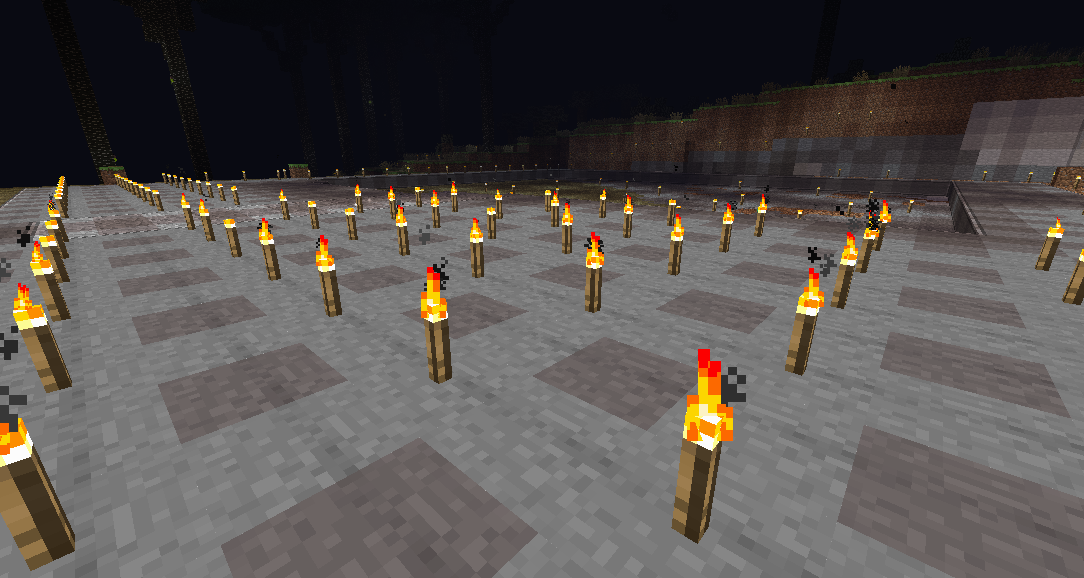Setting Up Shop: BFC Comes to TAG
Over the course of the first week of our Big Fried Chicken franchise revival, perhaps my most difficult task has been trying to explain to others just what it is we’re doing. “My professor and some of my peers and I log on to an online game every night and try to build a virtual KFC” doesn’t do much to impress. “It’s an anthropological study into the developing sociological and economical structures of a complex sandbox game that serves as a microcosm for the real world!” raises some eyebrows, but not much else. My thoughts on this project are, at the moment, scattershot ; I hope that through writing the following weekpost (and subsequent ones) that I’ll attain some kind of focus. Bear with me as I try to reign in my thoughts and hopefully happen upon something of substance.
In a nutshell: after having played Minecraft on a vanilla server for the first time as part of a semester-long project in ENGL398E (Videogames and/as Theory), I am now part of a research team that plays on a heavily modded server. We are, in addition to being researchers, construction workers: we’ve been tasked with recreating a building that – to the extent of my knowledge, since I never visited it when it was up and running – will eventually be able to automate the process of cooking chicken ad infinitum, which can then be consumed to keep our in-game avatars from starving to death. How it does this is currently beyond me – as is much of the intricacies of Minecraft, much less a modded version of it – but I’m hoping the matter will be elucidated as the project wears on.
In short – and I’m just trying to parse my thoughts here – our characters need cooked food to survive, as hunger will eventually deplete life and, well, being alive is fairly integral to getting anything done in Minecraft. This can be a lengthy process: chicken must be found, slaughtered, and the meat must be collected, then cooked (or “smelted”) in a furnace that must be built and stocked with fuel. The BFC restaurant can essentially do all of that for you. Over the first week, we’ve been in the process of building one of these buildings.
A few members of our team have been playing on the TAG server for significantly longer, and so their experience and know-how has been invaluable; as much as we may need things like Netherrack or Abyssal Stone, without the knowledge of where to acquire these resources, construction would slowl to a crawl. GersandeLF, our glorious leader and manager, dipped into their own gathered resources to build barracks for our use, a common area where the team can store & share resources, as well as sleep or hold meetings.
Which sort of brings us to the idea of the ‘commons’ that is something of a focal point in this project. My first few play sessions in the TAG server were overwhelming. On the ENGL398E server, all of the contributors had, more or less, a simultaneous start. We were handed a newly minted sandbox and were told to build; while certain parts of the server certainly developed faster than others, there was a general awareness of what was going on around you, whether through periodic strolls around the various team bases or simply by hearing about it in class. Logging onto a server that had already been developed in ways I scarcely knew were possible was immediately disorienting. On an unworked vanilla server, chopping down a tree to get wood was a simple enough task – on a server with an established population and civilization, even that task became a harrowing internal conflict: “What if the tree I’m about to cut down belongs to someone else? What if I’m not supposed to be cutting down trees in this area? What if this tree has some sentimental value to another player?! What if cutting down this tree unleashes a horde of Endermen on the world bringing about (another) apocalypse?!?!” – Irrational? Slightly, maybe, but still very real. I was almost paralyzed by a fear of acting in self-interest that would trigger an actual tragedy of the commons. This came from the fact that the commons, in this case, were completely alien to me: they existed well before I joined and a community was already well established. I didn’t load up in an empty field as zombies bore down on me, but instead in a plaza surrounded by farms, apartment buildings, train stations, and more. The mods only contributed to that sense of alienation.
So, what interests me is the idea of just what the commons are; what forms and states of development they can take, and how they’re interacted with by different members of the common in question. How is a society affected when the commons in question are more than just a grazing pen for cattle? How do interactions change when some people have contributed more to the commons than others? More tangentially, some questions that I hope to address in later weekposts are: Are resources finite, and what makes them so? Why do people look for ways to circumvent that? Is the less tangible idea of experience and knowledge a ‘resource’? What is the relationship between our roleplaying and emulating real world businesses and the virtual commons we are working on?
Needless to say, I’m excited to find out more, and now I’m really craving fried chicken.


Oh my gosh you called me a glorious leader I feel like an evil capitalist… http://kidsonstoke.com/wp-content/uploads/2014/05/glorious-leader-3.jpg